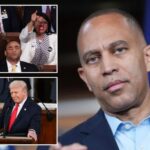

The term “Christian nationalism” has been used by the Left as a means of dismissing social conservatives who believe in the role of religion, or Judeo-Christian values, in everyday life. In this series, the Washington Examiner will analyze what it actually means to be a “Christian nationalist,” why the term is maligned and misunderstood, and what role, if any, it might play in a future Trump administration. Part Three will look at its possible role in a future Trump presidency.
In January 2025, if current polls hold through Election Day, former President Donald Trump will have secured a second term as president of the United States.
Speculation is rife about what people the former president would surround himself with, and he admitted last month he made mistakes with some of his early hires in his first term.
Some figures on the Left have claimed Trump seeks to infuse his second term with a “Christian nationalist” agenda, often trying to portray traditional Christian values in a negative light.
The Trump campaign has insisted that it alone will decide on his policies and personnel in a future administration, and it has worked to distance itself from the GOP groups crafting proposals.
“Despite our being crystal clear, some ‘allies’ haven’t gotten the hint, and the media, in their anti-Trump zeal, has been all-too-willing to continue using anonymous sourcing and speculation about a second Trump administration in an effort to prevent a second Trump administration,” campaign advisers Susie Wiles and Chris LaCivita said in a memo issued last December.
That memo was the second sent by the campaign to address speculation over the makeup and approach of Trump’s 2025 plans.
But the memos haven’t stopped the speculation.
A February Politico story mentioned Project 2025, an effort led by the conservative Heritage Foundation that includes more than 100 groups aiming to influence presidential policy, saying it “offers more visibility into what policy agenda a future Trump administration might pursue.”
Trump has vowed to fight “anti-Christian bias,” and white evangelical Christians, in particular, are among his most consistent supporters, backing him at a rate of better than 80% in 2020.
The term “Christian nationalism” is not widely embraced by conservatives, even those who back a biblical understanding of morality or view the U.S. as being founded on Judeo-Christian values. When asked about the Left’s claims, the Trump campaign pointed back to the December memos.
Project 2025’s “Mandate for Leadership” policy book calls to “protect faith-based grant recipients from religious liberty violations and maintain a biblically based, social science-reinforced definition of marriage and family.”
It also includes other proposals popular with religious conservatives, such as promoting alternatives to abortion and opposing “the new woke gender ideology.” But the 920-page document doesn’t mention the term “Christian nationalism,” or even “nationalism” alone, a single time.
Further, the groups comprising Project 2025 are far from monolithic.
Former Trump official Stephen Miller’s America First Legal Foundation and the relatively new American Moment profess wildly different views of the GOP movement than other members, such as Young America’s Foundation, which is tied to former President Ronald Reagan and holds a more “establishment”-type perspective.
Project 2025 did not comment on the record for this story.
Some groups are more open about the religious roots of their policy ideas than others.
America First Policy Institute, a GOP organization stacked with former Trump administration officials and allies, issued a pamphlet last October titled “Biblical Foundations — Ten Pillars for Restoring a Nation Under God.”
“For nearly 2,000 years, the gospel of Jesus Christ has been the greatest force for human flourishing the planet has ever seen,” it reads. “Without a Christian worldview and values, Western civilization … does not emerge. And the fullest expression of that civilization has been the United States of America.”
Arguing that “God has called His Church to be active in the issues of our day,” it lists 10 policy goals that include making America energy independent, providing for safe and secure communities, giving parents more control over their children’s education, and finishing the border wall.
Former Trump administration Office of Management and Budget Director Russ Vought has argued that “Christian nationalism” should be seen as a benign term and makes explicit the religious underpinnings of his policy views.
Citing Yoram Hazony, Vought points to Bible verses such as Deuteronomy 2:5, 9, and 19 as supporting the concept of strong national borders.
Trump’s campaign has signaled that Trump would pursue staunchly GOP, though not necessarily overtly religious, policies during a second term. Many of those policies involve directing the federal government to play a larger role.
One of the proposals under the umbrella of Trump’s “Agenda47,” referring to the next president’s status as the nation’s 47th, involves overhauling the college accreditation system to ensure colleges and universities are “defending American tradition and Western civilization” and purging their “Marxist maniacs.” Another proposal involves directing the Justice Department to conduct “a complete investigation into the use of police state tactics by federal authorities to arrest conservatives and Christians.”
A separate question is whether Trump is even the proper candidate to promote proposals with Judeo-Christian underpinnings.
Trump’s divorces and marital infidelities are well documented, as is his support for abortion rights and sparse church attendance before running for president in 2015.
Raised in the Presbyterian faith, Trump visited many different churches once in office and switched his affiliation to nondenominational Christianity in 2020. Some supporters welcomed the move, while others saw it as naked pandering to his voter base.
Kristin Kobes Du Mez, a professor of history and gender studies at Calvin University in Michigan, said Trump is “a credible spokesperson for the Christian nationalist cause because Christian nationalism is about power, not virtue.”
“In fact, precisely because he’s not inhibited by traditional Christian virtue, he’s the best guy for the job,” she said. “He’s promised to protect Christianity — by which he means privileging a particular strand of predominantly white, conservative Christianity — and he doesn’t appear to care much for democratic norms in the process.”
The Biden campaign is also leaning into attacks based on the idea that Trump will force through policies that don’t have support outside of his base, particularly those tied to Project 2025.
Team Biden has sent 19 separate email blasts this year with “Project 2025” or “Trump’s Project 2025” in the headline, alleging that Trump will ban abortion, raise housing costs, discriminate against racial minorities, cut taxes for the rich, and cut Social Security and Medicare, among other things.
CLICK HERE TO READ MORE FROM THE WASHINGTON EXAMINER
But while Trump has distanced himself from Project 2025, he embraces and says he will fight for his Christian supporters in a second term. Speaking to the National Religious Broadcasters convention last month, he promised to “fight even harder for Christians.”
“No one will be touching the cross of Christ under the Trump administration. I swear to you, that will never happen,” Trump said. “When I return to the White House, I will once again aggressively defend religious liberty just like I had for four years. You had no problems, but we’re going to defend it in all of its forms.”
Mabinty Quarshie contributed to this report.





